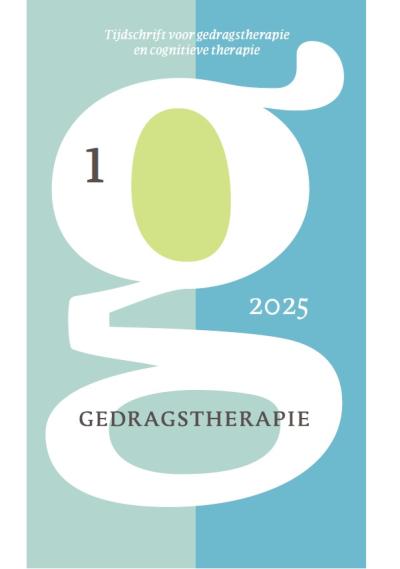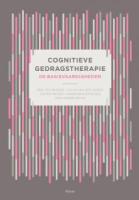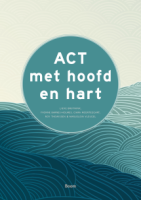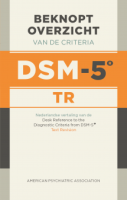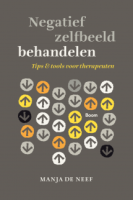Inhoud
E-mental health interventies voor angststoornissen
Samenvatting
E-mental health interventies, dat wil zeggen psychologische interventies waarbij gebruik wordt gemaakt informatie en communicatie technologie, kunnen een belangrijke plaats innemen in de zorg voor angststoornissen. De internationale wetenschappelijke literatuur op dit gebied betreft voornamelijk effectonderzoeken naar zelfhulpcursussen, aangeboden via het internet, welke elementen bevatten van de cognitieve gedragstherapie. Twee meta-analyses (Andrews, Cuijpers, Craske, McEvoy & Titov, 2010; Cuijpers, Marks, Van Straten, Cavanagh, Gega & Andersson , 2009) laten positieve resultaten zien van dergelijke interventies op meerdere angststoornissen. In Nederland is over het algemeen nog een schaars aanbod van effectieve evidence-based online interventies. Meer ontwikkeling en implementatie op nationaal niveau is aan te raden.
Literatuur
- Andersson, E., Enander, J., Andren, P., Hedman, E., Ljotsson, B., Hursti, T., et al. (2012). Internet-based cognitive behaviour therapy for obsessive-compulsive disorder: a randomized controlled trial. Psychological medicine, 42(10), 2193-2203.
- Andersson, G., Carlbring, P., Furmark, T., S.O.F.I.E. Research Group (2012a). Therapist experience and knowledge acquisition in internet-delivered CBT for social anxiety disorder: a randomized controlled trial. Plos one, 7(5), e37411.
- Andersson, G., Estling, F., Jakobsson, E., Cuijpers, P., & Carlbring, P. (2011). Can the patient decide which modules to endorse? An open trial of tailored internet treatment of anxiety disorders. Cognitive behaviour therapy, 40(1), 57-64.
- Andersson, G., Paxling, B., Roch-Norlund, P., Ostman, G., Norgren, A., Almlov, J., et al. (2012b). Internet-based psychodynamic versus cognitive behavioral guided self-help for generalized anxiety disorder: a randomized controlled trial. Psychotherapy and psychosomatics, 81(6), 344-355.
- Andersson, G., Waara, J., Jonsson, U., Malmaeus, F., Carlbring, P., & Ost, L.G. (2009). Internet-based self-help versus one-session exposure in the treatment of spider phobia: a randomized controlled trial. Cognitive behaviour therapy, 38(2), 114-120.
- Andrews, G., Cuijpers, P., Craske, M. G., McEvoy, P., & Titov, N. (2010). Computer therapy for the anxiety and depressive disorders is effective, acceptable and practical health care: a meta-analysis. Plos one, 5(10), e13196.
- Balkom, A.L.J.M. van, Vliet, I.M. van, Emmelkamp, P.M.G., Bockting, C.L.H., Spijker, J., Hermens, M.L.M., & Meeuwissen, J.A.C. namens de Werkgroep Multidisciplinaire richtlijnontwikkeling Angststoornissen/Depressie (2012). Multidisciplinaire richtlijn Angststoornissen (Tweede revisie). Richtlijn voor de diagnostiek, behandeling en begeleiding van volwassen patiënten met een angststoornis. Utrecht: Trimbosinstituut.
- Ballegooijen, W. van, Riper, H., Straten, A. van, Kramer, J., Conijn, B., & Cuijpers, P. (2011). The effects of an Internet based self-help course for reducing panic symptoms-Don't Panic Online: study protocol for a randomised controlled trial. Trials, 12, 75.
- Ballegooijen, W. van, Riper, H., Klein, B., Ebert, D.D., Kramer, J., Meulenbeek, P., & Cuijpers, P. (2013). An Internet-Based Guided Self-Help Intervention for Panic Symptoms: Randomized Controlled Trial. Journal of medical internet research, 15(7), e154.
- Carlbring, P., Maurin, L., Torngren, C., Linna, E., Eriksson, T., Sparthan, E., et al. (2011). Individually-tailored, Internet-based treatment for anxiety disorders: A randomized controlled trial. Behaviour research and therapy, 49(1), 18-24.
- Christensen, H., Griffiths, K. M., & Farrer, L. (2009). Adherence in internet interventions for anxiety and depression. Journal of medical internet research, 11(2), e13.
- Cuijpers, P., Marks, I. M., Straten, A. van, Cavanagh, K., Gega, L., & Andersson, G. (2009). Computer-aided psychotherapy for anxiety disorders: a meta-analytic review. Cognitive behaviour therapy, 38(2), 66-82.
- Dear, B.F., Titov, N., Schwencke, G., Andrews, G., Johnston, L., Craske, M.G., et al. (2011). An open trial of a brief transdiagnostic internet treatment for anxiety and depression. Behaviour research and therapy, 49(12), 830-837.
- Donkin, L., Christensen, H., Naismith, S.L., Neal, B., Hickie, I.B., & Glozier, N. (2011). A systematic review of the impact of adherence on the effectiveness of e-therapies. Journal of medical internet research, 13(3), e52.
- Donkin, L., & Glozier, N. (2012). Motivators and motivations to persist with online psychological interventions: a qualitative study of treatment completers. Journal of medical internet research, 14(3), e91.
- Furmark, T., Carlbring, P., Hedman, E., Sonnenstein, A., Clevberger, P., Bohman, B., et al. (2009). Guided and unguided self-help for social anxiety disorder: randomised controlled trial. British journal of psychiatry, 195(5), 440-447.
- Graaf, R.d., Have, M.t., & Dorsselaer, S.v. (2010). De psychische gezondheid van de Nederlandse bevolking. NEMESIS-2: Opzet en eerste resultaten. Utrecht: Trimbos-instituut.
- Greist, J.H., Marks, I.M., Baer, L., Kobak, K.A., Wenzel, K.W., Hirsch, M.J., et al. (2002). Behavior therapy for obsessive-compulsive disorder guided by a computer or by a clinician compared with relaxation as a control. Journal of clinical psychiatry, 63(2), 138-145.
- Gulliver, A., Griffiths, K.M., & Christensen, H. (2010). Perceived barriers and facilitators to mental health help-seeking in young people: a systematic review. Bmc psychiatry, 10.
- Harrison, V., Proudfoot, J., Wee, P.P., Parker, G., Pavlovic, D.H., & Manicavasagar, V. (2011). Mobile mental health: review of the emerging field and proof of concept study. Journal of mental health, 20(6), 509-524.
- Hirai, M., & Clum, G.A. (2005). An Internet-based self-change program for traumatic event related fear, distress, and maladaptive coping. Journal of traumatic stress, 18(6), 631-636.
- Johansson, R., Sjoberg, E., Sjogren, M., Johnsson, E., Carlbring, P., Andersson, T., et al. (2012). Tailored vs. standardized internet-based cognitive behavior therapy for depression and comorbid symptoms: a randomized controlled trial. Plos one, 7(5), e36905.
- Kersting, A., Kroker, K., Schlicht, S., Baust, K., & Wagner, B. (2011). Efficacy of cognitive behavioral internet-based therapy in parents after the loss of a child during pregnancy: pilot data from a randomized controlled trial. Archives of Women's Mental Health, 14(6), 465-477.
- Khanna, M.S., & Kendall, P.C. (2010). Computer-assisted cognitive behavioral therapy for child anxiety: results of a randomized clinical trial. Journal of consulting and clinical psychology, 78(5), 737-745.
- Klein, B., Richards, J.C., & Austin, D.W. (2006). Efficacy of internet therapy for panic disorder. Journal of behavior therapy and experimental psychiatry, 37(3), 213-238.
- Knaevelsrud, C., & Maercker, A. (2007). Internet-based treatment for PTSD reduces distress and facilitates the development of a strong therapeutic alliance: a randomized controlled clinical trial. Bmc psychiatry, 7.
- Lange, A., Rietdijk, D., Hudcovicova, M., Ven, J P. Van de, Schrieken, B., & Emmelkamp, P.M.G. (2003). Interapy: A controlled randomized trial of the standardized treatment of posttraumatic stress through the Internet. Journal of consulting and clinical psychology, 71(5), 901-909.
- Lange, A., Ven, J.P. van de, Schrieken, B., & Emmelkamp, P.M.G. (2001). Interapy. Treatment of posttraumatic stress through the Internet: a controlled trial. Journal of behavior therapy and experimental psychiatry, 32(2), 73-90.
- Litz, B.T., Engel, C.C., Bryant, R.A., & Papa, A. (2007). A randomized, controlled proof-of concept trial of an internet-based, therapist-assisted self-management treatment for posttraumatic stress disorder. American journal of psychiatry, 164(11), 1676-1683.
- Meulenbeek, P., Willemse, G., Smit, F., Van Balkom, A., Spinhoven, P., & Cuijpers, P. (2010). Early intervention in panic: pragmatic randomised controlled trial. British journal of psychiatry, 196(4), 326-331.
- Meyerbroker, K., & Emmelkamp, P. M. (2010). Virtual reality exposure therapy in anxiety disorders: a systematic review of process-and-outcome studies. Depression and anxiety, 27(10), 933-944.
- National Institute for Health and Clinical Excellence (NICE)(2011). Common mental health disorders: Identification and pathways to care. London: NICE.
- Paxling, B., Almlov, J., Dahlin, M., Carlbring, P., Breitholtz, E., Eriksson, T., et al. (2011). Guided internet-delivered cognitive behavior therapy for generalized anxiety disorder: a randomized controlled trial. Cognitive behaviour therapy, 40(3), 159-173.
- Powell, J., Inglis, N., Ronnie, J., & Large, S. (2011). The characteristics and motivations of online health information seekers: cross-sectional survey and qualitative interview study. Journal of medical internet research, 13(1), e20.
- Riper, H., Andersson, G., Christensen, H., Cuijpers, P., Lange, A., & Eysenbach, G. (2010). Theme issue on e-mental health: a growing field in internet research. Journal of medical internet research, 12(5), e74.
- Rizzo, A., Buckwalter, J.G., John, B., Newman, B., Parsons, T., Kenny, P., et al. (2012). STRIVE: Stress Resilience In Virtual Environments: a pre-deployment VR system for training emotional coping skills and assessing chronic and acute stress responses. Studies in health technology and informatics, 173, 379-385.
- Ruwaard, J., Lange, A., Schrieken, B., & Emmelkamp, P. (2011). Efficacy and effectiveness of online cognitive behavioral treatment: a decade of interapy research. Studies in health technology and informatics, 167, 9-14.
- Schneider, A.J., Mataix-Cols, D., Marks, I.M., & Bachofen, M. (2005). Internet-guided self-help with or without exposure therapy for phobic and panic disorders - A randomised controlled trial. Psychotherapy and psychosomatics, 74(3), 154-164.
- Seekles, W., Straten, A. van, Beekman, A., Marwijk, H. van, & Cuijpers, P. (2011). Effectiveness of guided self-help for depression and anxiety disorders in primary care: a pragmatic randomized controlled trial. Psychiatry research, 187(1), 113-120.
- Silfvernagel, K., Carlbring, P., Kabo, J., Edstrom, S., Eriksson, J., Manson, L., et al. (2012). Individually Tailored Internet-Based Treatment for Young Adults and Adults With Panic Attacks: Randomized Controlled Trial. Journal of medical internet research, 14(3), 32-44.
- Spek, V., Cuijpers, P., Nyklicek, I., Riper, H., Keyzer, J., & Pop, V. (2007). Internet-based cognitive behaviour therapy for symptoms of depression and anxiety: a meta-analysis. Psychological medicine, 37(3), 319-328.
- Spence, J., Titov, N., Dear, B.F., Johnston, L., Solley, K., Lorian, C., et al. (2011). Randomized controlled trial of Internet-delivered cognitive behavioral therapy for posttraumatic stress disorder. Depression and anxiety, 28(7), 541-550.
- Storch, E.A., Caporino, N.E., Morgan, J.R., Lewin, A.B., Rojas, A., Brauer, L., et al. (2011). Preliminary investigation of web-camera delivered cognitive-behavioral therapy for youth with obsessive-compulsive disorder. Psychiatry research, 189(3), 407-412.
- Straten, A. van, Cuijpers, P., & Smits, N. (2008). Effectiveness of a web-based self-help intervention for symptoms of depression, anxiety, and stress: randomized controlled trial. Journal of medical internet research, 10(1), e7.
- Titov, N., Andrews, G., Davies, M., McIntyre, K., Robinson, E., & Solley, K. (2010). Internet treatment for depression: a randomized controlled trial comparing clinician vs. technician assistance. Plos one, 5(6), e10939.
- Titov, N., Dear, B.F., Schwencke, G., Andrews, G., Johnston, L., Craske, M.G., et al. (2011). Transdiagnostic internet treatment for anxiety and depression: a randomised controlled trial. Behaviour research and therapy, 49(8), 441-452.
 © 2009-2025 Uitgeverij Boom Amsterdam
© 2009-2025 Uitgeverij Boom Amsterdam
De artikelen uit de (online)tijdschriften van Uitgeverij Boom zijn auteursrechtelijk beschermd. U kunt er natuurlijk uit citeren (voorzien van een bronvermelding) maar voor reproductie in welke vorm dan ook moet toestemming aan de uitgever worden gevraagd:
Behoudens de in of krachtens de Auteurswet van 1912 gestelde uitzonderingen mag niets uit deze uitgave worden verveelvoudigd, opgeslagen in een geautomatiseerd gegevensbestand, of openbaar gemaakt, in enige vorm of op enige wijze, hetzij elektronisch, mechanisch door fotokopieën, opnamen of enig andere manier, zonder voorafgaande schriftelijke toestemming van de uitgever.
Voor zover het maken van kopieën uit deze uitgave is toegestaan op grond van artikelen 16h t/m 16m Auteurswet 1912 jo. Besluit van 27 november 2002, Stb 575, dient men de daarvoor wettelijk verschuldigde vergoeding te voldoen aan de Stichting Reprorecht te Hoofddorp (postbus 3060, 2130 KB, www.reprorecht.nl) of contact op te nemen met de uitgever voor het treffen van een rechtstreekse regeling in de zin van art. 16l, vijfde lid, Auteurswet 1912.
Voor het overnemen van gedeelte(n) uit deze uitgave in bloemlezingen, readers en andere compilatiewerken (artikel 16, Auteurswet 1912) kan men zich wenden tot de Stichting PRO (Stichting Publicatie- en Reproductierechten, postbus 3060, 2130 KB Hoofddorp, www.cedar.nl/pro).
No part of this book may be reproduced in any way whatsoever without the written permission of the publisher.
Inloggen VGCt en VVGT
Leden van de VGCt en de VVGT loggen in via de site van hun vereniging. Als u op die site bent ingelogd als lid, vindt u daar een button naar het Tijdschrift voor Gedragstherapie.
English
Behavioral Therapy: Journal for Behavioral Therapy and Cognitive Therapy ISSN 0167-7454
Information in English can be found here.



